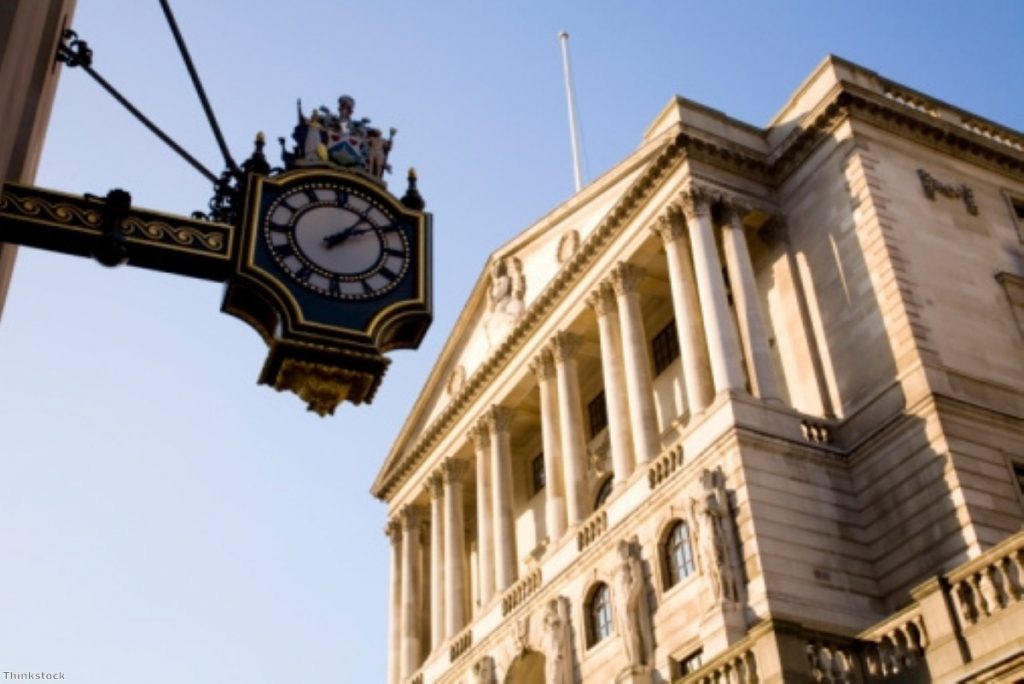Downgraded growth overshadows falling unemployment
The Bank of England has downgraded Britain's 2012 growth forecast, cancelling out good news on unemployment figures for the coalition.
Three months ago the Bank had predicted that the UK economy would grow by 1.2% in 2012. That forecast was today cut to 0.8%.
But David Cameron insisted that Bank of England governor Sir Mervyn King was praising the coalition for a "textbook response" to the current economic situation.
May's inflation report predicted that GDP will fluctuate this year due to the unpredictable impact of one-off events such as the Queen's Golden Jubilee and the Olympics.


Sir Mervyn warned that the biggest threat to the UK economy continued to be the ongoing eurozone crisis, however.
"The possibility that the substantial challenges within the euro area will lead to significant economic and financial disruption continues to pose the greatest threat to the UK recovery," he said.
The Bank of England has been in discussions with the government preparing contingency plans for the collapse of the euro, he confirmed.
Sir Mervyn was in gloomy mood at the press conference launching the report, rejecting calls for him to assess forecasts "in the old way" before the 2008 financial crisis hit.
"I don't think it makes sense to say the risks we face are easily calculable," he says. "There's enormous uncertainty out there."
News of the downgraded forecast is taking the shine off this month's unemployment figures, which saw the number of those out of work fall by 45,000 in the first three months of the year, down by 0.2% to 8.2% on the quarter.
The number of economically inactive people also fell, to 23%, while the number of people in work increased by 0.2% to 70.5%.
Employment minister Chris Grayling pointed out that unemployment had now fallen for three months in a row.
"I wouldn't for a moment pretend for a moment we're over the challenge we face, but at least we're heading in the right direction in the labour market," he said.
The number of people working part-time who would prefer a full-time job is now at a high of 18%, the Office for National Statistics pointed out.
It also noted that the number of non-UK born workers in employment was up by 16,000, while the number of UK-born workers fell by 8,000.
Nevertheless Mr Grayling's sentiments were underlined by Mr Cameron at the start of prime minister's questions this lunchtime.
"We're not remotely complacent about this because, although there is good news about youth unemployment and the claimant count down, there are still too many people who want full-time work who are in part-time work," he said.
In response to a question from Labour backbencher Ian Austin highlighting the "calamitous collapse" in Mr Cameron's reputation for competence, however, the prime minister adopted a different tone.
"Today unemployment has fallen, the claimant count has come down, more people are in work," he said.
"Yes, we have a difficult economic situation, but you listen to the governor of the bank of England this morning, he is saying we are coming up with a textbook response to clear up the mess made by people like him."
"Optimists might claim that this is the early stage of a real recovery, with entrepreneurial start-ups leading the way," commented Nigel Meager, director of the Institute for Employment Studies.
He suggested that the poorly performing UK economy and the fact that spending cuts have yet to bite meant upbeat assessments should be met with caution.
"Until GDP growth resumes to its pre-recession path, and businesses are sufficiently confident to start hiring extra employees in significant numbers, it is too soon to talk of a sustainable jobs recovery," Mr Meager added.
Shadow work and pensions secretary Liam Byrne welcomed the news of falling unemployment, but pointed out that youth unemployment remained above the one-million mark at 1.02 million.
"More worrying for the outlook is that the number of redundancies has surged to 50,000 more than last year and the number of vacancies is down by over 10,000," he said.
"That's why it was so complacent for the government to give us a budget that failed to deliver on jobs. People in Britain are fighting through and this government is failing to lift a finger to help."

